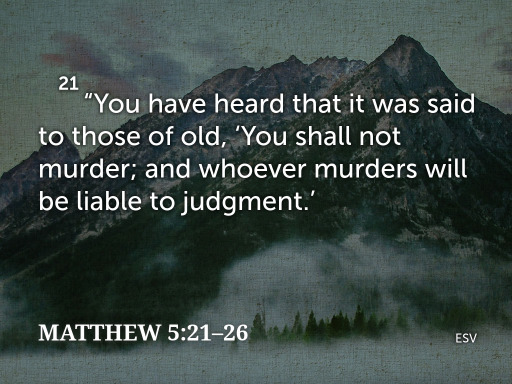Be Reconciled - Matthew 5:21-26 - March 19, 2017

Notes
Transcript
Sermon Tone Analysis
A
D
F
J
S
Emotion
A
C
T
Language
O
C
E
A
E
Social
Introduction
Today we are continuing our series through the book of Matthew… Sermon on the mount… Section on the Old Testament as addressed by Jesus.
Review: Two weeks ago, when we were last in Matthew, we began this section on how Jesus calls Kingdom Citizens to live in light of the Law and the prophets.
Jesus now begins applying his teaching on what it looks like that He has fulfilled the Law.
He gives 6 examples.
Each is one is a law from the Old Testament, which He just finished explaining was still fully the authoritative Word of God.
I want to give the rest of Chapter 5 some context.
For I tell you, unless your righteousness exceeds that of the scribes and Pharisees, you will never enter the kingdom of heaven.
6 OT commands,
He doesn’t negate them but expands them
Some are superseded by the kingdom, not because they are invalid but because they never get to that place (Divorce and oaths)
This does not contradict Jesus’ earlier statement that the OT is still valid because He is not negating the Laws but making them no longer needed.
I. Jesus has the authority to apply, expand, and properly interpret the Law (21-22, 27-28, 31-32, 33-34, 38-39, and 43-44)
I. Jesus has the authority to apply, expand, and properly interpret the Law (21-22, 27-28, 31-32, 33-34, 38-39, and 43-44)
“You have heard that it was said to those of old, ‘You shall not murder; and whoever murders will be liable to judgment.’ But I say to you that everyone who is angry with his brother will be liable to judgment; whoever insults his brother will be liable to the council; and whoever says, ‘You fool!’ will be liable to the hell of fire.
II. The command not to murder has always meant not to hate (22)
II. The command not to murder has always meant not to hate (22)
But I say to you that everyone who is angry with his brother will be liable to judgment; whoever insults his brother will be liable to the council; and whoever says, ‘You fool!’ will be liable to the hell of fire.
III. The issue of murder, hate, and unjust anger is so serious it is better to reconcile than to worship God (23-24)
III. The issue of murder, hate, and unjust anger is so serious it is better to reconcile than to worship God (23-24)
So if you are offering your gift at the altar and there remember that your brother has something against you, leave your gift there before the altar and go. First be reconciled to your brother, and then come and offer your gift.
IV. For the sake of everyone involved, reconcile quickly (25-26)
IV. For the sake of everyone involved, reconcile quickly (25-26)
Come to terms quickly with your accuser while you are going with him to court, lest your accuser hand you over to the judge, and the judge to the guard, and you be put in prison. Truly, I say to you, you will never get out until you have paid the last penny.
For an illustration of this, turn to 1 Corinthians 11
But in the following instructions I do not commend you, because when you come together it is not for the better but for the worse. For, in the first place, when you come together as a church, I hear that there are divisions among you. And I believe it in part, for there must be factions among you in order that those who are genuine among you may be recognized. When you come together, it is not the Lord’s supper that you eat. For in eating, each one goes ahead with his own meal. One goes hungry, another gets drunk. What! Do you not have houses to eat and drink in? Or do you despise the church of God and humiliate those who have nothing? What shall I say to you? Shall I commend you in this? No, I will not.
For I received from the Lord what I also delivered to you, that the Lord Jesus on the night when he was betrayed took bread, and when he had given thanks, he broke it, and said, “This is my body, which is for you. Do this in remembrance of me.” In the same way also he took the cup, after supper, saying, “This cup is the new covenant in my blood. Do this, as often as you drink it, in remembrance of me.” For as often as you eat this bread and drink the cup, you proclaim the Lord’s death until he comes.
Whoever, therefore, eats the bread or drinks the cup of the Lord in an unworthy manner will be guilty concerning the body and blood of the Lord. Let a person examine himself, then, and so eat of the bread and drink of the cup. For anyone who eats and drinks without discerning the body eats and drinks judgment on himself. That is why many of you are weak and ill, and some have died. But if we judged ourselves truly, we would not be judged. But when we are judged by the Lord, we are disciplined so that we may not be condemned along with the world.
So then, my brothers, when you come together to eat, wait for one another— if anyone is hungry, let him eat at home—so that when you come together it will not be for judgment. About the other things I will give directions when I come.